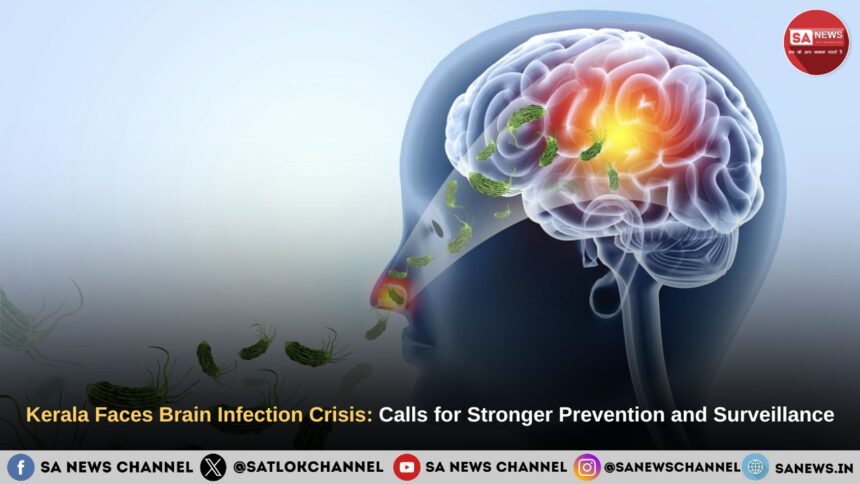Concerns about the state’s healthcare readiness and accountability have been raised after the Kerala Assembly criticized the Health Department over recurring cases of brain infections. While the government insists it is improving preventive measures, the opposition blames negligence. Experts stress the importance of early detection, sanitation, and disease monitoring to prevent further outbreaks.
- Highlights
- Kerala Assembly Criticizes Health Department Over Recurring Brain Infections
- What Are Infections of the Brain?
- Why Are the Infections Recurring?
- The Opposition’s Stand
- The Government’s Defense
- Public Fear and Reactions
- Problems With the Health System in Kerala
- The Political Angle
- Expert Warnings
- Comparisons With Other States
- The Way Forward
- What Kerala’s Brain Infection Outbreaks Teach About Real Protection from Life’s Uncertainty
- FAQs
Highlights
- Kerala Assembly debates brain infection outbreaks.
- The opposition says the Health Department is negligent.
- Meningitis and encephalitis remain serious threats.
- Public anxiety increases as recurring cases surface.
- Experts urge better infrastructure, awareness, and prevention.
Kerala Assembly Criticizes Health Department Over Recurring Brain Infections
Kerala has long been admired for its progressive healthcare system. But recently, the state has been battling a reputation crisis. Recurring cases of brain infections have alarmed the public and fueled fiery debates in the Kerala Assembly. Opposition leaders accuse the Health Department of failing to prevent these outbreaks, while the government argues it is doing everything possible to protect citizens.
Why This Debate Matters
The Assembly is the place where policies are questioned and leaders are held accountable. When opposition parties cornered the government over recurring brain infections, it was more than just politics—it reflected public anxiety. For ordinary families, especially parents, the worry is real: “Is my child safe?”
What Are Infections of the Brain?
Brain infections include conditions such as:
- Encephalitis: Brain swelling often caused by viruses.
- Meningitis: Infection of the protective membranes around the brain and spinal cord.
- Brain Abscess: A collection of pus in brain tissue caused by bacteria or fungi.
These are not minor illnesses. Symptoms like persistent fever, confusion, seizures, and severe headaches can turn fatal if not treated quickly.
Why Are the Infections Recurring?
Health professionals suggest several reasons for these recurrent outbreaks:
- Mosquito-borne viruses thrive in Kerala’s tropical climate.
- Bacteria spread through contaminated water and poor sanitation.
- Delayed diagnosis leads to unchecked transmission.
- Treatment delays are caused by healthcare gaps in rural areas.
The Opposition’s Stand
Leaders of the opposition criticized the Health Department, accusing the government of being reactive rather than proactive. They claim that recurrent cases are evidence of negligence. Their demand: better surveillance, more transparency, and accountability for lapses.
The Government’s Defense
The ruling party defended its track record by highlighting Kerala’s success in handling crises like the Nipah virus and COVID-19. They argued that awareness programs, testing drives, and preventative health camps are ongoing. However, they admitted that more robust systems are needed to stop recurrences.
Public Fear and Reactions
For citizens, politics is secondary to safety. Hospitals are under immense pressure from patients’ families, and parents are anxious about their children’s health. Social media is filled with debates about whether Kerala’s much-praised healthcare model is weakening.
Also Read: Global food crisis: causes and implications for India
Problems With the Health System in Kerala
Even with a strong reputation, Kerala faces hurdles:
- Shortage of specialists in rural hospitals.
- Infrastructure gaps limiting quick diagnosis.
- Overworked medical professionals battling multiple issues.
- An urban-rural divide in access to quality care.
The Political Angle
Like most crises, this health scare has become political. While the ruling party maintains that everything is under control, opposition parties are keen to highlight government failures. For citizens, however, this “blame game” does little to solve the actual problem.
Expert Warnings
Doctors emphasize the importance of preventive healthcare. Epidemiologists recommend real-time disease tracking, early diagnosis, and improved sanitation campaigns. Without these, outbreaks will continue to return like “unwelcome guests.”
Comparisons With Other States
While Kerala is still ahead of many states in healthcare, the repeated outbreaks show that no system is perfect. States like Tamil Nadu and Maharashtra have launched successful surveillance programs that Kerala could learn from.
The Way Forward
To rebuild trust and ensure safety, Kerala must:
- Improve hospital infrastructure in all districts.
- Strengthen disease surveillance systems using technology.
- Launch community-level awareness drives.
- Invest in sanitation and mosquito control initiatives.
What Kerala’s Brain Infection Outbreaks Teach About Real Protection from Life’s Uncertainty
The recurring brain infections in Kerala expose the limitations of human efforts and remind us of a deeper reality—sufferings are the result of bad karma, which means sin. No government policy or medical advancement can completely shield humanity from disease and death. True relief comes only from eradicating sins through true worship of the Supreme God. This worship not only brings inner peace but also ensures lasting happiness.
There are countless examples where patients suffering from incurable diseases like AIDS and cancer have been cured without medical treatment, simply by practicing the true devotion given by Sant Rampal Ji Maharaj. While healthcare systems must continue improving, people must also realize that the ultimate protection is spiritual. Only by adopting true worship can one overcome karma, eliminate suffering, and attain eternal salvation (moksha).
FAQs
Q1: What is the controversy surrounding Kerala’s Health Department?
Recurring brain infection cases suggest negligence in prevention and monitoring.
Q2: Which brain infections are being reported?
Mainly encephalitis, meningitis, and brain abscesses.
Q3: How is the government responding
It claims to be increasing testing, awareness drives, and preventive measures.
Q4: What do experts suggest?
Early detection, improved sanitation, mosquito control, and stronger healthcare infrastructure.
Q5: What does this mean for the reputation of Kerala’s healthcare system?
It shows that even advanced systems need constant upgrades to remain reliable.









